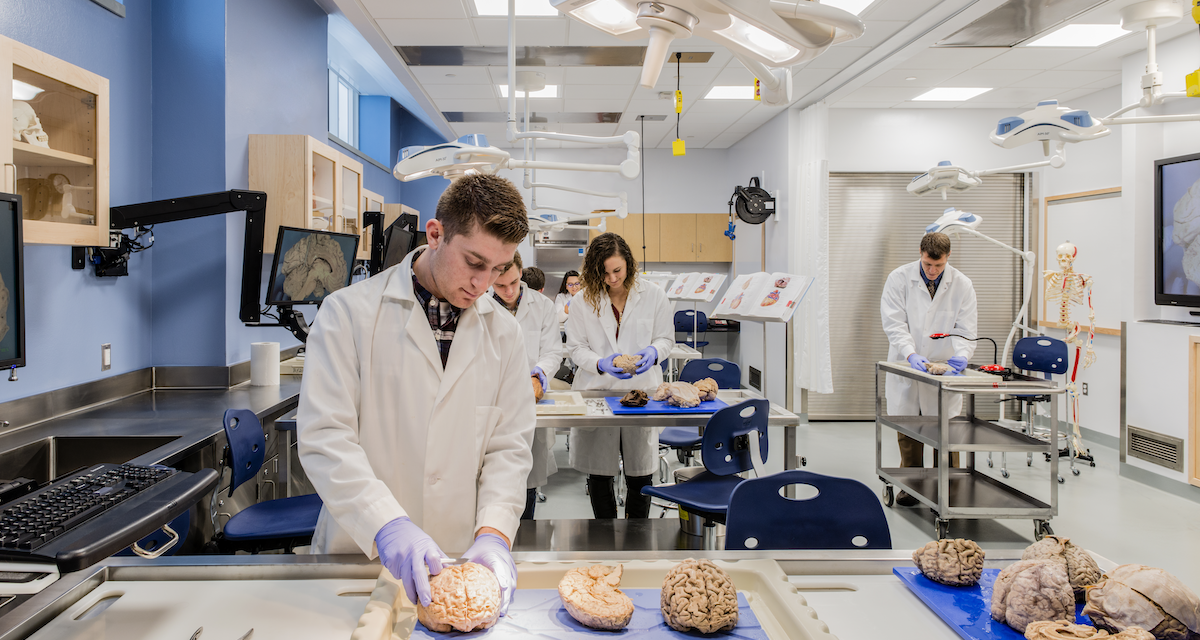Why study nursing at a liberal arts college?
Nursing jobs are expected to grow by 15 percent by 2026—a rate much higher than the average growth rate for occupations, according to the Bureau of Labor Statistics. Healthcare practitioners are in high demand, and excellent training is critical for success in the workplace.
But being a nurse is about more than performing tests, evaluating conditions and administering medicine. It’s about being an ally and an advocate during some of the most trying times in a person’s life. So, if the practice of nursing is about the head and the heart, shouldn’t the educational preparation be similar?
Four foundational components
As Professor of Kinesiology Dr. Sean Clark says, “When I’m in the classroom, I recognize that many of my students will be tomorrow’s healthcare providers. With this knowledge, my teaching focuses on helping students not only become competent in their understanding of the human body but also grow in their care and compassion for the wounded and broken.”
A strong liberal arts education offers a breadth of coursework in biology, kinesiology and chemistry, which prepares students for academic success and for understanding much of the basic medical aspects of nursing. But building a liberal arts foundation to a healthcare career also helps nurses excel in four less tangible but equally important areas:
1. Compassion
Nurses must understand the science—but also the human. As you provide care to people enduring both exciting and excruciating periods, the ability to extend empathy becomes paramount. A liberal arts education taps into the more holistic, sometimes emotional, elements of nursing that technical training cannot. And ample opportunities for character-shaping, co-curricular experiences (like mission trips or student government) prepare you to lead and serve others well.
2. Critical thinking
No matter what aspect of nursing you enter, you’ll inevitably be faced with difficult situations that will force you to address hard questions. At best, they’ll challenge your assumptions. But more likely, they’ll require you to think (and feel) on a deep, even spiritual, level. Taking courses in the humanities and social sciences will broaden your viewpoint and help you make connections between seemingly disparate ideas. You can learn to think like a nurse—but reason like a scientist, analyze like a psychologist and care like a social worker.
3. Communication
On any given day, you’ll interface with dozens of patients, and in many cases their family members—identifying conditions or injuries, aiding treatment and communicating aftercare plans. Because nurses work with diverse people in diverse contexts, these rudimentary conversations can quickly become nuanced. The liberal arts tradition places a high value on informed discourse and dialogue, preparing you to communicate clearly (and listen well) across cultural and language differences.
4. Collaboration
As a nurse, you’ll be part of a medical team that will likely include doctors, specialists and other nurses. It takes more than a single person to care for each patient, so your ability to be a team player is crucial. The interdisciplinary nature of a liberal arts experience forces you outside the comfort zone of your specific major or industry, and sets the stage for constructive collaboration.
“I would not be the same type of nurse”
Building a liberal arts foundation to a nursing career “taught me to see the human behind the science,” wrote one Gordon College alumna. “It prepared me by helping me love the patient that just yelled at me, and to pray for my patients before I walk in the room. It taught me how to stand firm in my faith even though I am surrounded by people’s difficulties.”
“Sometimes I think I should have gone straight into nursing school, but then I realize that I would not be the same type of nurse if I had done that. Through your example and teachings, I learned not only how to love and care for others, but also how to love and care for myself. I am a better nurse because of you all.”
The best of both worlds
Gordon College’s dual-degree nursing program (in partnership with Curry College) offers the best of both worlds—a Christian liberal arts education and the technical training required for a career in healthcare. Because of Gordon and Curry’s proximity to Boston, students have access to some of the world’s best academic medical facilities—including Boston Children’s Hospital, Massachusetts General Hospital, Tufts Medical Center and Beth Israel Deaconess Medical Center.
“Former students always talk about the extra ‘something’ they received from Gordon,” says Professor of Biology Dr. Craig Story. “That ‘something’ is hard to pin down, but it’s priceless. I think it has a lot to do with the Christ-centered mentorship and broad liberal arts background that shapes them as a person. When they enter a nursing program after Gordon, they are more than ready, and poised to be very successful.”
 The Bell
The Bell